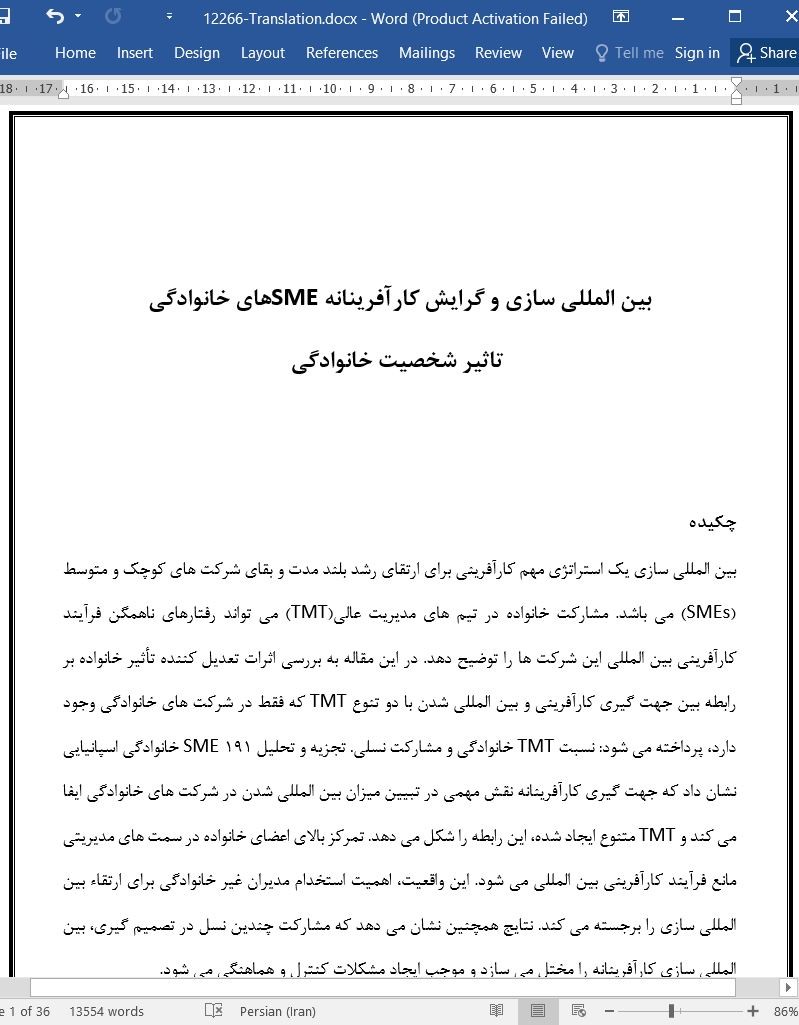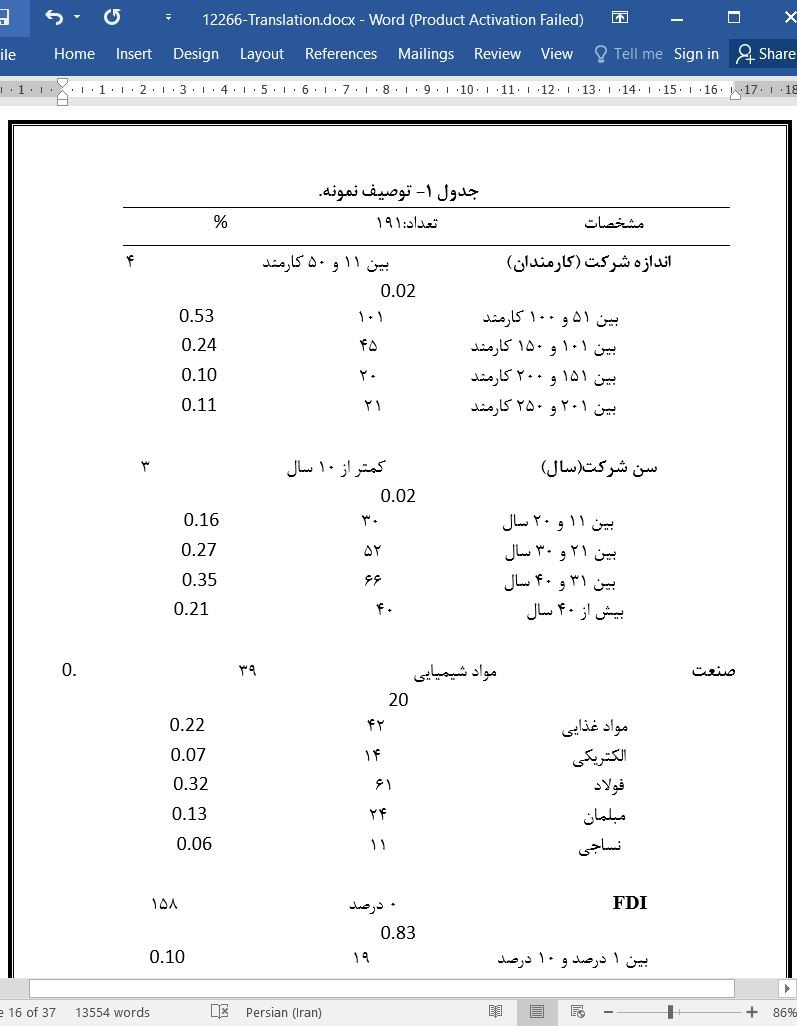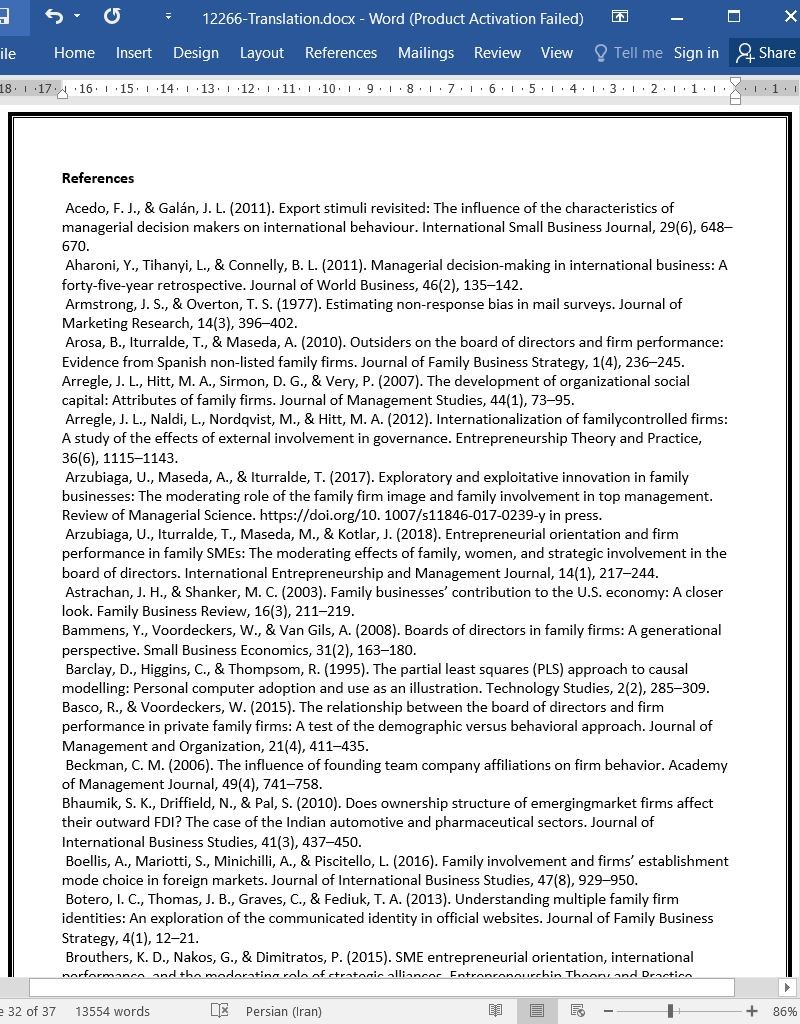
بین المللی سازی و گرایش کارآفرینانه SMEهای خانوادگی
چکیده
بین المللی سازی یک استراتژی مهم کارآفرینی برای ارتقای رشد بلند مدت و بقای شرکت های کوچک و متوسط (SMEs) می باشد. مشارکت خانواده در تیم های مدیریت عالی(TMT) می تواند رفتارهای ناهمگن فرآیند کارآفرینی بین المللی این شرکت ها را توضیح دهد. در این مقاله به بررسی اثرات تعدیل کننده تأثیر خانواده بر رابطه بین جهت گیری کارآفرینی و بین المللی شدن با دو تنوع TMT که فقط در شرکت های خانوادگی وجود دارد، پرداخته می شود: نسبت TMT خانوادگی و مشارکت نسلی. تجزیه و تحلیل 191 SME خانوادگی اسپانیایی نشان داد که جهت گیری کارآفرینانه نقش مهمی در تبیین میزان بین المللی شدن در شرکت های خانوادگی ایفا می کند و TMT متنوع ایجاد شده، این رابطه را شکل می دهد. تمرکز بالای اعضای خانواده در سمت های مدیریتی مانع فرآیند کارآفرینی بین المللی می شود. این واقعیت، اهمیت استخدام مدیران غیر خانوادگی برای ارتقاء بین المللی سازی را برجسته می کند. نتایج همچنین نشان می دهد که مشارکت چندین نسل در تصمیم گیری، بین المللی سازی کارآفرینانه را مختل می سازد و موجب ایجاد مشکلات کنترل و هماهنگی می شود.
1. مقدمه
گرایش یا جهت گیری کارآفرینانه(EO)، تمایل شرکت به کارآفرینی؛ یک عنصر مهم در فرآیند بین المللی سازی کسب و کار ها می باشد(جانتونن، پامالانن و کیلاکو،2005؛ جاوالگی و تاد، 2011؛ لیو، لی و زو ،2011؛ ریپولس میلیا، من گازاتو بولارد و سانچز پی نادو، 2007). با این وجود ، مطالعات کمی عوامل مؤثر بر رابطه بین EO و توسعه بین المللی در شرکت های کوچک و متوسط (SMEs) را مورد تجزیه و تحلیل قرار داده اند، و حتی مطالعات کمتری نیز شرکت های خانوادگی را بررسی نموده اند(کالابرو، کامپوپیانو، باسکو و پوکال،2017؛ هرناندز پرلینز و مانکبو لوزانو ،2016؛ هرناندز پرلینز، مورانو گارسیا و یانز اراک ،2016)، گرچه اینگونه شرکتها رایج ترین شکل سازمانهای تجاری در جهان می باشند(هیبل،کویین، کراگ و مورس،2018). مقالات تأیید كرده است كه شرکتهای خانوادگی هنگام بین المللی شدن(گریوز و توماس، 2006) و در استراتژی های بین المللی سازی، از نظر نگرش و رفتار متفاوت هستند( به طور مثال، فرناندز و نیتو ، 2006؛ بولیس، ماریوتی، مینی چلی و پیسی تلو، 2016).
Abstract
Internationalization is an important entrepreneurial strategy for promoting the long-term growth and survivability of small and medium-sized enterprises (SMEs). Family involvement in top management teams (TMTs) can explain the heterogeneous behaviors of these firms’ international entrepreneurship process. This paper analyzes the moderating effects of the family’s influence on the relationship between entrepreneurial orientation and internationalization with two TMT diversities found only in family firms: the family TMT ratio and generational involvement. An analysis of 191 Spanish family SMEs indicated that entrepreneurial orientation plays a significant role in explaining the degree of internationalization in family firms and that a diversely formed TMT shapes this relationship. A high concentration of family members in managerial positions hinders the international entrepreneurship process. This fact highlights the importance of hiring non-family managers to promote internationalization. The results also reveal that involving multiple generations in decision-making hampers entrepreneurial internationalization, generating control and coordination problems.
1. Introduction
Entrepreneurial orientation (EO), the firm’s disposition to entrepreneurship, is a key element in businesses’ internationalization process (Jantunen, Puumalainen, Saarenketo, & Kyläheiko, 2005; Javalgi & Todd, 2011; Liu, Li, & Xue, 2011; Ripollés-Meliá, Menguzzato-Boulard, & Sánchez-Peinado, 2007). However, few studies have analyzed factors affecting the relationship between EO and international development in small and medium-sized enterprises (SMEs), and even fewer have analyzed family firms (Calabrò, Campopiano, Basco, & Pukkal, 2017; Hernández-Perlines & Mancebo-Lozano, 2016; Hernández-Perlines, Moreno-García, & Yañez-Araque, 2016), although such firms represent the most common form of business organization in the world (Hiebl, Quinn, Craig, & Moores, 2018). The literature has acknowledged that family firms differ in attitudes and behaviors when internationalizing (Graves & Thomas, 2006) and in internationalization strategies (e.g., Fernández & Nieto, 2006; Boellis, Mariotti, Minichilli, & Piscitello, 2016).
چکیده
1. مقدمه
2. پیشینه نظری و فرضیه سازی
2.1 جهت گیری کارآفرینانه و بین المللی سازی
2.2 مشارکت خانوادگی در تیم مدیریت عالی
2.2.1. اثر تعدیل کننده نسبت TMT خانواده
2.2.2. اثر تعدیل کننده مشارکت نسلی در TMT
3. روش شناسی تحقیق
3.1. نمونه و جمع آوری داده
3.2 اندازه گیری متغیر
4. تحلیل ها و نتایج
4.1 روایی و پایایی
4.2 ارزیابی مدل ساختاری
4.3. بررسی استحکام
5. بحث
6. آثار، محدودیت ها و تحقیقات آتی
منابع
ABSTRACT
1. Introduction
2. Theoretical background and hypotheses development
2.1. Entrepreneurial orientation and internationalization
2.2. Family involvement in the top management team
2.2.1. The moderating effect of the family TMT ratio
2.2.2. The moderating effect of generational involvement in the TMT
3. Research methodology
3.1. Sample and data collection
3.2. Variable measurement
4. Analyses and results
4.1. Validity and reliability
4.2. Assessment of the structural model
4.3. Robustness check
5. Discussion
6. Contributions, limitations, and future research
References
- اصل مقاله انگلیسی با فرمت ورد (word) با قابلیت ویرایش
- ترجمه فارسی مقاله با فرمت ورد (word) با قابلیت ویرایش، بدون آرم سایت ای ترجمه
- ترجمه فارسی مقاله با فرمت pdf، بدون آرم سایت ای ترجمه



